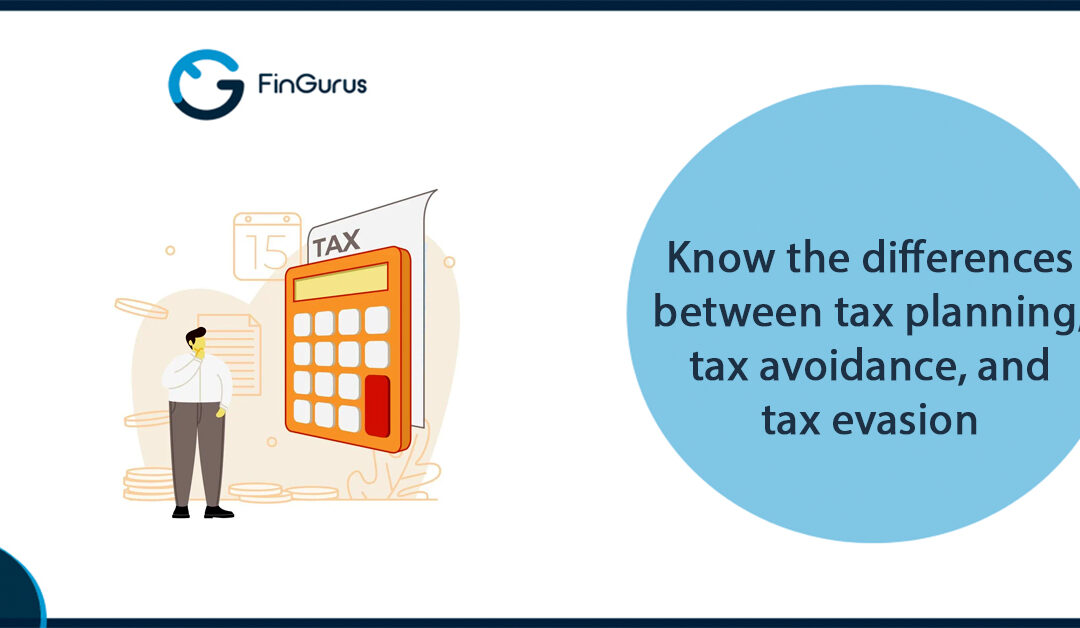Tax is a compulsory fee levied by governments on eligible individuals or entities to gather revenue for public works. The money collected in the form of taxes is used by the government to fund different public expenditure programs and to run the country judiciously.
So, we already know the importance of taxes in the betterment of the country.
However, paying taxes can sometimes be a burden on the taxpayers and therefore, people try to minimize their tax liability. Though it’s unethical to not pay the required tax amount, taxpayers choose some ways like tax planning, tax avoidance and tax evasion to reduce their tax burden.
Although these terms might sound similar and they share a common goal of reducing the tax burden, the method/ approach used in the three cases is not the same.
Keep scrolling to know more about the differences between tax planning, tax avoidance and tax evasion and have better clarity on how these help avoid legal consequences.
What is Tax Planning?
Tax planning is a completely legalized process of minimizing one’s tax liability by using various exemptions, rebates and deductions provided by the Income Tax Laws.
In this process, the income and expenses of the given taxpayer in a respective financial year are analyzed to estimate the amount he/ she needs to pay as tax. Then, further analysis of the available deductions and exemptions is done to minimize the person’s tax liability.
For example, provision 80C provided by the Tax Laws is popular for tax deductions. Other popular tax-saving instruments include Public Provident funds, Tax Saxing Fixed Deposits, Mutual funds, National Savings certificate, etc.
In most cases, a taxpayer does not have the required understanding of different taxation provisions and how they need to be implemented to minimize tax liabilities in a legalized way. Therefore, it is suggested that the taxpayers always seek advice from professionals for proper tax planning.
What is Tax Avoidance?
Tax avoidance is another legalized way of minimizing tax liability. However, unlike tax planning, this process involves using some ways that are unacceptable to the government.
In other words, reducing tax liability via tax avoidance means making use of the loopholes in the taxation laws. Though it is completely legal, it isn’t an advisable way since it involves taking unfair advantage of the shortcomings of the rules and most importantly, it fails the intention of the lawmaker.
Although both tax planning and tax avoidance are legalized ways of reducing the tax burden, there is a key difference between them. In the case of tax planning, the taxpayer is using the schemes and instruments suggested by the government to minimize tax liability. But, when a taxpayer uses tax avoidance, he/ she is following ways that the government did not expect him/ her to do.
The government is trying to do away with the loopholes by making regular amendments to the income tax laws so that people can stop manipulating the spirit or intent of the law to avoid taxation. With these regular amendments, it is becoming difficult for taxpayers to find loopholes and use tax avoidance.
What is Tax Evasion?
Unlike tax planning and tax avoidance, tax evasion involves illegal measures to reduce the tax burden or avoid paying taxes.
In tax evasion, the taxpayer intentionally minimizes his tax liability by either showing an increase in expenses or a decrease in income. Both increasing the expenses and decreasing the income leads to the profit getting reduced, which results in a lower tax burden. For example, dealing in cash without disclosing it in the book of accounts can be categorized as tax evasion.
Here are some of the illegal ways used to evade taxes are:
- Placing false statements
- Not disclosing relevant documents
- Exhibiting personal expenses as business expenditures
- Not maintaining proper records and statements
- Showing fake expenses
To eliminate the issue of tax evasion, the government is constantly coming up with new mandates and rules. Besides, the government sends notices to the taxpayers when they find a discrepancy between the tax that is paid by the person and the amount that should have been paid.
Moreover, do note that tax evasion is a completely illegal way of reducing the tax burden and can lead to heavy penalties and punishment under the law.
Key Takeaway
All three measures can help one minimize his tax burden. However, amongst tax planning, tax avoidance and tax evasion, tax planning is arguably the best way to reduce your tax liability since it helps save taxes in a logical as well as legal way.
Other than this, one needs to ensure that the entire tax filing process, incorporating various tax-deducing instruments, etc, is done by the experts. Because given the complications and the technicalities in the taxation laws, one might end up getting involved in tax fraud, unintentionally.
Need more clarity regarding how you can save taxes? Contact us right away!

